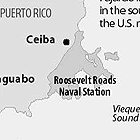|
 |
|
Esta página no está disponible en español. Orlando SentinelBase Closing Will Hit Many Puerto Ricans In WalletBy Maria Padilla
January 13, 2003
Towns would feel impact (ORLANDO SENTINEL) ---------- CEIBA, Puerto Rico -- When Ramona Pérez de Ares was a little girl, her father worked as a civilian employee at the old Ramey Air Force Base on the western side of the island. She recalls that the family lived right outside the main gate to the air base, which has since closed. Nowadays, Pérez lives in this eastern town just a short distance from the huge Roosevelt Roads Naval Station, and her life now, as it was then, is dominated by the presence of the U.S. military, from which she derives substantial benefits. Pérez, 59, owns two homes and an apartment she rents to Navy personnel, earning more than $1,400 per month. "There are lots of people here in Ceiba who live off rents. If the base closes, we get stuck with no money," she said. Such thoughts are a recurring theme in the eastern island towns that surround Roosevelt Roads, ranging from Fajardo in the north to Naguabo in the south. If Roosevelt Roads were to close, as the Navy called for last week after announcing that it would halt by May all bombing exercises on the island of Vieques, the economic impact would be felt most keenly in this region. This is the part of Puerto Rico where the contrarian point of view on the much-publicized Vieques movement is found. Here, direct and daily interaction with Navy personnel -- and direct and indirect benefits to local economies -- mean Vieques is not an issue of stark contrasts, but one with blurred edges. The Navy is a friend here, not an enemy. And everyone knows someone who either works for or benefits from Roosevelt Roads. Roosevelt Roads pumps about $250 million annually into the Puerto Rican economy in the form of military and civilian salaries, new construction, improvements and upkeep of the base, which includes about 8,000 acres of waterfront property. "All this area would be affected, from Canóvanas to Naguabo," said Fernando Caraballo, who was fishing in Fajardo near the pier where the ferry to Vieques anchors. "How will the Puerto Rico government make up for the money the base generates here?" asked Caraballo, 56, who works as a carpenter for the town of Río Grande, west of Fajardo. Those millions of dollars are not an abstract figure to the more than 80,000 people who live in the eastern region. Ceiba and Naguabo, in particular, do not otherwise have thriving economies. Locals say there is only one factory remaining in Ceiba, and speculation is that it, too, may close. Since the mid-1990s, Puerto Rico has lost many manufacturing jobs after Congress abolished lucrative tax credits to U.S. manufacturers based on the island. Unemployment in rural towns often is much higher than in the San Juan metropolitan area, in some cases as high as 50 percent, making local government sometimes the only source of employment. Steady jobs and stable incomes are hard to come by. But the naval base, and the direct and indirect benefits it generates, has been a constant fixture in the lives of thousands of people here. So much so that in the town of Ceiba, households with earnings reported average incomes of nearly $31,000 per year, the highest of the three towns, according to the 2000 census. In fact, Fajardo, a town with a more diverse economy and whose population of 40,000 is twice that of Ceiba's, reported average household earned income of only $26,000. Many people cling desperately to the belief that the Navy won't close the base, because the thought is overwhelming. Pérez, for instance, thinks the Navy should leave Vieques but not Ceiba. "The base is different. They're not bombing here, and they're not contaminating here," she said. Consuelo Aponte, who owns El Makito bar and restaurant just down the road from Roosevelt Roads' main entrance, a place where many base employees eat lunch, has no quarrel with the military. "I see it this way: We have a friendship [with the Navy]. This is like a Navy town," said Aponte, 48, who shudders at the thought of Ceiba becoming like Naguabo, where average household earnings are nearly $10,000 below that of Ceiba. Caraballo, who until recently had a weekend job in Ceiba building a Navy officer's home, said he would have preferred to see a more constructive dialogue with the Navy about Vieques. "It's not that the Americans are the last Coca-Cola in the desert, but they do contribute something," Caraballo said. Fajardo fisherman Ramón Western Vargas, 86, is a World War II veteran who once worked at the old San Juan naval base in Isla Grande before it closed and also helped build Roosevelt Roads. He said Fajardo is the closest large town to Ceiba as well as Vieques, and many soldiers and civilian employees like to shop in local stores, including Wal-Mart, Big Kmart and Sears. Fajardo's greater variety of restaurants also attracts people to the town, Western Vargas said. Those retail sales would be lost if the Navy pulled out of not only Vieques but also Ceiba, a possibility that makes another local fisherman, Carmelo Félix Rivera, very sad. He said the Navy rescued him 20 years ago when he was stranded at sea. "If the Navy leaves, I would feel like there's something missing here," said Rivera, 61. "We're so used to having them here."
|

 ----------
----------